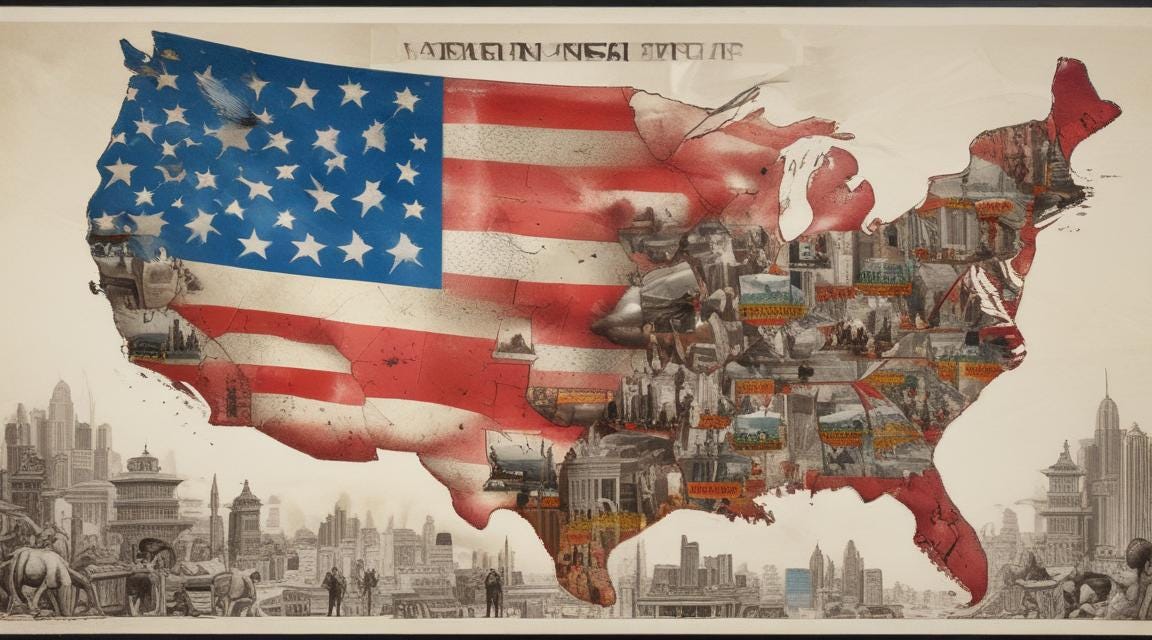Signs of America's Decline COULD Be Greatly Exaggerated
It's our decision, and in our exhaustion, we may choose wrong.
Is America an empire? In the historical context of ancient Rome, 19th Century Britain, or the USSR, the answer is no. However, concerning economic, cultural, political, and military power, America stands as the closest entity to an empire in today’s world. While we don't exert control over every corner of the globe, events like our involvement in the Ukraine-Russia conflict underscore our unrivaled significance on the global stage.
This discussion brings us to a concerning new report from the Rand Corporation, indicating that America has begun to decline. This decline is evidenced by China's ascent, our diminished influence on developing nations, relatively sluggish economic growth, and internal discord reminiscent of periods like the Civil War. Consequently, we find ourselves in a worrisome phase of retreat. As the report warns, "When great powers slide from preeminence, they seldom reverse this trend."
Rand Corporation is not a partisan think tank but a 67-year-old nonprofit research center, renowned for unbiased government-sponsored research spanning from technology to social change. Its credibility is evident in its contributions to diverse fields like the U.S. space program, Soviet studies, artificial intelligence, and drug policy. When Rand speaks, it demands attention, and its latest report presents a reality that warrants serious consideration.
Rand doesn't advocate for an America functioning as a de facto empire, but it does suggest that our role in maintaining global peace, fostering free markets, and advancing science and technology benefits us all. From my perspective, these benefits far outweigh the costs of maintaining our position. In essence, the world relies on us, and we, in turn, depend on the world.
Our societal divisions have been aggravated by voices on both the Left and Right exploiting public apprehensions – think of Trump's "American carnage" – thereby exacerbating the situation by disheartening those exposed to alarmist media narratives. Doomsayers, particularly personalities on networks like Fox News, have found a receptive audience among those sensing something is amiss but struggling to articulate it.
Last year, respected polling organization Pew Research provided evidence of this prevailing pessimism. Their findings showed significant majorities of Americans foreseeing a weaker economy, reduced global significance, and wider political divisions in 25 years.
However, no one can definitively predict our future, whether in five or 25 years. The notion that we are powerless to influence our trajectory is entirely misguided. As Rand highlights, we could reverse this decline with an engaged citizenry recognizing the challenges and agreeing on necessary actions, an approach termed "anticipatory renewal."
Achieving unity and a shared sense of purpose will require years and different leadership from what we currently have, but it's achievable. A blueprint for this was proposed in the book "Why Empires Fall: Rome, America and the Future of the West" by historian Peter Heather and economist John Rapley. They identified similar challenges facing Western Europe and the United States – aging populations, economic stagnation, and military rivals – which can be surmounted with the right strategies.
Carefully managed increases in legal immigration could address population concerns, as more immigrants spur economic activity. Policies promoting our advantages in areas like artificial intelligence, culture, capital, and technology development, where we lead globally, can further bolster our economy. While domestic production remains crucial, leveraging our strengths is vital for global competitiveness.
Regarding military power, the United States maintains a significant advantage, which we must sustain both for peacekeeping and national pride. Nevertheless, we should expect allies to share this burden whenever feasible, as demonstrated in recent events when Israel repelled an attack with assistance from a coalition led by the U.S.
We possess the means to safeguard our global interests, maintain our standard of living, and uphold our identity as a major power, whether classified as an empire or not. The Rand report concludes optimistically, stating, "The United States has tremendous residual strengths and a proven capacity for resilience and renewal."
The question now is whether we will have leaders with the courage to acknowledge our challenges, the determination to reverse our decline, and the ability to unite us toward a common purpose.



My Dad thought the country was done in the late 70's... He of the 10th mountain division in WW2 and an Irish citizen... Became a U.S. citizen when he survived...loved this country though as do I... Be really distressed today... Not sure I really know the answers...Character is the one quality that seems lacking ... If the folks we elected had any ...Trump would be on the ash heap of history instead of running for office... people had any he would not be anywhere near the top in any poll.
Very well written, with optimism. Thanks Adam!